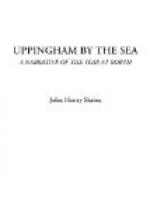They said, “and
why should this thing be?
What danger lowers by land or
sea?
They ring the tune of Enderby.”
JEAN INGELOW.
“England, when she goes to war,” said a Prime Minister not long ago, “has not to consider whether she will be able to fight a second or a third campaign.” We remembered that we were Englishmen; and on January 19th, 1877, went down again with a good courage for our third campaign on the Welsh coast. A furious gale was howling that day among the hills of Cardiganshire, recalling to the memory of some of us the stormy Ides of March, when the pioneers of our little army first set foot in Borth. Omina principiis inesse solent. This gale was sounding the key-note of the term’s adventures.
The cause of our return to Borth for a third term is briefly told. We had gone home at Christmas, uncertain whether we should meet again there or at Uppingham. Dr. Acland, of Oxford, to whose active sympathy with the school in its perplexities we must at least gratefully allude, had undertaken on our behalf to inspect the sanitary condition of Uppingham, and give us his judgment on the expediency of reassembling there. His judgment was submitted to the attention of the Trustees at their meeting, on December 22nd, when it was resolved that, “In the face of Dr. Acland’s report, the Trustees deeply regret they cannot at present recall the school to Uppingham.” So we went back to the sea.
Our numbers this term just missed by one the normal total of three hundred. In the two preceding terms they had been smaller by some five or six. The camp at Borth, therefore, had not suffered from want of recruits. Indeed, it was now foreseen that the return to Uppingham would be for about one-third of the school a first arrival there.
The beginning of the end of our exile seemed to be marked by the reduced number of masters’ families in camp. Some had gone into winter quarters at Aberystwith; some had already resettled at Uppingham. Our connection with home began to be retightened also by parochial and other common transactions, in which we took our share from a distance. Not, indeed, that the connection had ever been discontinued. We had left too precious pledges behind us. The deserted gardens did not waste all their sweetness on the air which we had exchanged for a “fresher clime.” A thin intermittent stream of their products found its way along the nine hours of railway through most of the year. Flowers, fruit, and vegetables might raise tantalising memories of the pleasant places where they grew, but were not the less welcome to dwellers in this somewhat austere tract where they did not grow or grew very niggardly. The traffic in these delicacies drew the attention of the London and North-Western Railway Company, whose officials called to account one of our servants for travelling with an excess of personal luggage.




